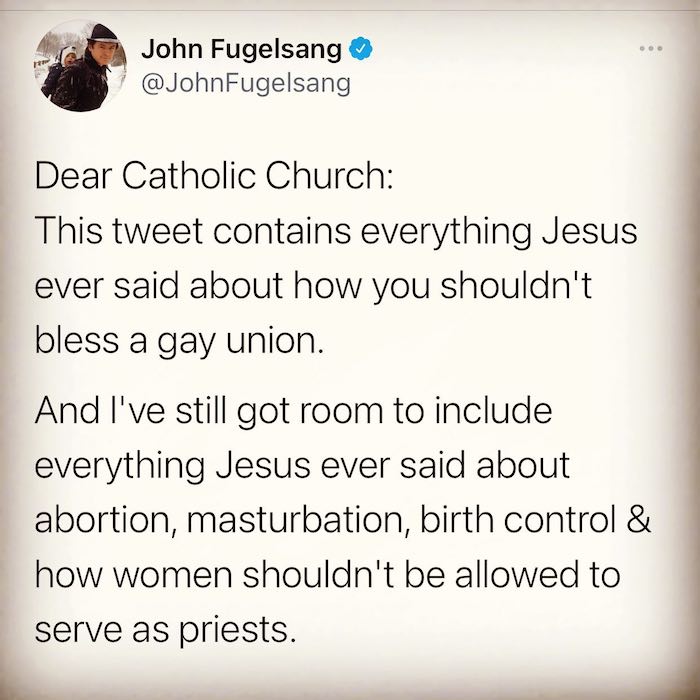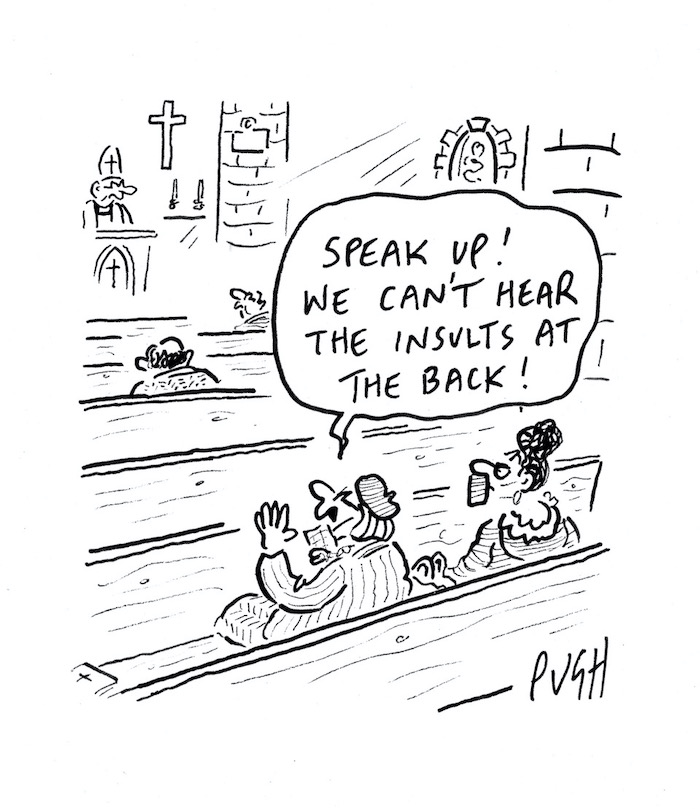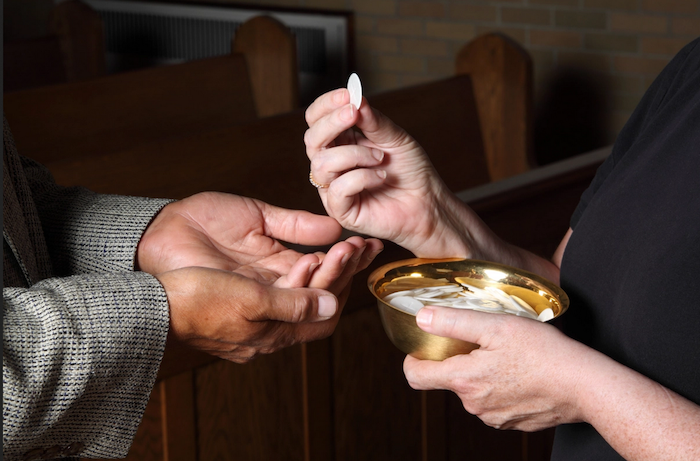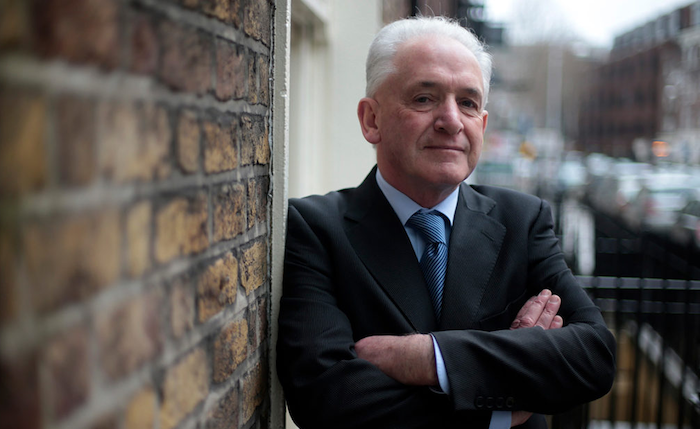
Bishops condemned for losing women in translation

A co-founder of the Association of Catholic Priests in Ireland has criticised the bishops of England and Wales for their lack of consultation in opting for the Catholic Edition of the gender-exclusive English Standard Version (ESV) translation of the Bible for use in a new version of the lectionary.
Fr Brendan Hoban, a retired parish priest in Co. Mayo, noted that the ESV refers to men and women as “men” and translates humanity as “man”. Other translations, such as the Revised New Jerusalem Bible, prefer inclusive language.
Accusing the 22 bishops of England and Wales of “a conspicuously bad decision”, he alleged there had been no consultation with priests, Religious or laity, biblical scholars or liturgical experts.
In a statement on 22 January, the bishops of England and Wales said the ESV was chosen because it is seen as fulfilling the qualities the Church seeks for “accuracy of translation which conveys the meaning of the biblical authors” as well as for the “dignity and accessibility of language needed for a worthy proclamation of the Word of God”.
The Bishops of Scotland announced in July 2020 that they had also chosen the English Standard Version – Catholic Edition for the lectionary.

Writing in his column in the Western People, Fr Hoban noted that traditionally the Catholic Churches of England, Wales, Scotland and Ireland cooperate over the publication of liturgical books and their revised editions for financial and other reasons.
He asked if the Irish bishops would now accept the “unilateral England (and Wales) decision”, or would they “follow again the dismal, dangerous example of their colleagues on the other side of the Irish sea?”
Fr Hoban wrote: “Will they compound a problem being visited on the Catholics of England and Wales by regularly and ritually insulting women as they listen to the Word of God being read at Mass – giving them another reason to cut their links with an institution that insists on patronising and disrespecting them to the point of misogyny?”
He added that if the Irish bishops do this, the recent words of the newly installed Archbishop of Dublin on leadership would be meaningless.
Fr Hoban was referring to Archbishop Dermot Farrell’s homily at his installation earlier this month, where he said: “Leadership in the Church is not about telling people what to do; rather it is about promoting co- responsibility and overcoming the mindset which runs the risk of relegating the baptised to a subordinate role, effectively keeping them on the edges of church life.”
According to Fr Hoban, the decision to adopt the ESV translation for the lectionary is “a watershed moment when women may eventually decide that no matter what the Catholic Church says, disrespect for women is sewn into its institutional seams”.
Complete Article ↪HERE↩!
Church is running out of reasons not to ordain women
Replacing the phrase ‘lay men’ with ‘lay persons’ is hardly a radical change

By Gina Menzies
Pope Francis recently announced that he would remove the phrase “lay men” from Canon 230 and replace it with “lay persons”. This change to the church’s legal code means that women can now be permanently installed as lectors or acolytes – essentially, readers, distributors of Communion and assistants at Mass and the sacraments.
Although not a radical change – women have been carrying out these duties for decades – the decision was welcomed by the international Women’s Ordination Conference.
It is seen by some as progress. However, it remains the case that married and single men can be ordained deacons in the Catholic Church. Women cannot.
In 2016 Francis established a commission to examine whether women could or should be ordained deacons. The commission’s report in 2019 has not been published. Stating that the outcome was inconclusive, Francis established another commission in 2020.
To date, calls for restoration of the diaconate to women have fallen on deaf ears in Rome
At least four such studies have taken place since the 1970s. None have recommended against women deacons.
Theologian Phyllis Zagano, whose research on the history and theology of women deacons is extensive and incontrovertible, was a member of the original commission but is not a member of this second commission. This does not bode well for a recommendation by it for ordination of women deacons.
To date, calls for restoration of the diaconate to women have fallen on deaf ears in Rome. Calls for reform of ministry and the reinstatement of women deacons and ordination of women to the priesthood come from many parts of the Catholic world.
The Synod of Bishops for the Pan-Amazon region in 2019 begged the pope to permit women deacons and married priests; it is not on its own. The newly consecrated Archbishop of Dublin Dermot Farrell, in an Irish Times interview on January 2nd, also stated that he would like to see women deacons, as did the Association of Catholic Priests of Ireland in 2014.
Attitude
In Germany, two bishops are on the record recently as calling for change in the church’s attitude to the ministry of women. Leading this group is Bishop Georg Bätzing of Limburg, elected president of the German bishops’ conference in 2020.
He went further, stating that it is increasingly difficult to justify the ban on ordaining women. Bishop Gebhard Fürst of Rottenburg-Stuttgart said in 2017 that women deaconesses are a “sign of the times”.
Restoration of women’s diaconate should not be seen as a solution to the declining numbers of men joining the priesthood, but rather as a means of accommodating the diversity of gifts, talents and decision-making that women would bring to ministry and leadership, thereby enriching the whole community.
There is clear, incontrovertible evidence from the Gospels and epigraphic discoveries that women were essential in the spread of Christianity
Phyllis Zagano, in her book Holy Saturday, cites numerous references to the ministry of women in the early church. Prof John O’Brien, in his recent book Women’s Ordination in the Catholic Church, argues convincingly that “ the early church’s developing theology of ministry focused not on the power conferred, but on the ecclesiastical relationship into which the ordained was conferred… Eucharistic presidency followed from pastoral leadership over a community.”
There is clear, incontrovertible evidence from the Gospels and epigraphic discoveries that women were essential in the spread of Christianity, as demonstrated in the resurrection and Pauline narratives.
A narrow anthropology of women based on child-bearing has persisted in church thinking. De-linking women from this one-dimensional understanding of what it means to be female is an urgent necessity if women in the Catholic Church are to be treated as disciples of equality.
Constant mantra
The constant mantra that only a male can image Christ suggests that gender is more relevant than humanity.
Complementarity of the sexes has been put forward as a justification for excluding women from ministry. This notion is anchored in papal writings in modern times, appearing frequently in the writings of Pius XII and more recently those of John Paul II.
Theologian Mary Hunt puts it very well when she says: “The growing biology and social scientific consensus in favour of the broad range of ways in which human beings live out their gender identity undermines the fragile and indefensible sexist and heterosexist anthropology on which the Catholic teaching on human sexuality is based.”
The institutional church is flying on one wing and breathing with one lung by refusing to value the diversity that women would bring to ministry. It will not be sufficient to appoint “safe” women to positions: diversity of culture, insight and knowledge are as necessary as the now more frequently stated objective of inclusion.
Women need to be treated on the basis of their humanity and willingness to be called to serve, not their gender. This would be the Christian way to proceed.
Complete Article ↪HERE↩!
Women Still Can’t Be Priests, But They’re Now Allowed to Do Other Stuff They’ve Definitely Been Doing All Along Anyway
Women now have Pope-sanctioned permission to continue serving Communion, but the priesthood remains a pipe dream

By Kayla Kibbe
Women are still barred from taking the priesthood in the Catholic Church, but Pope Francis has made some other small tweaks to the rules he thinks the ladies are gonna be pretty excited about. Thanks to the Cool Pope’s new amendments, per the Washington Post, women will now have the right to act as readers and altar servers during mass, and even to administer Communion.
If you, like me, are confused by this news because you’re pretty sure you can recall receiving a dry wafer from a woman at church before, you’re probably not wrong. Many women have already been performing these roles during Catholic mass for years, at the discretion of local bishops or priests, the Washington Post explained. What Pope Francis’s decision does, however, is formalize these roles as a right for women within the Church, one they cannot be denied on the basis of their sex. Previously, while women in many parts of the world were permitted to serve in these positions, individual Church authorities still retained, and sometimes executed, the right to enforce male-only altar services. Thanks to the Pope’s most recent decision, that will no longer be an option.
“Francis, on one side, is merely acknowledging reality on the ground, as it is right now,” said Massimo Faggioli, a professor of theology and religious studies at Villanova University. “But this is important because the [conservative] bishops have been contradicted, openly, by Pope Francis.”
Essentially, this all makes for a relatively insignificant shift in policy that falls far short of the large-scale changes needed within the Catholic Church to render its culture anything approaching progressive. While the Pope has characterized the decision as a step toward recognizing the “precious contribution” women are still capable of making to the Church despite not being men, any hope of claiming the priesthood remains distant for women of the Catholic faith.
“We’re still 100 steps behind the historic moment that we live,” said Cristina Simonelli, president of an Italian association of female theologians, who added that while Francis’s move marks a “minimal” step forward, it’s still “better than standing still.”
Anyway, congrats to the Catholic women who now have the Pope-sanctioned right to continue doing the same things they’ve been doing all along, and nothing more.
Complete Article ↪HERE↩!
I should no longer be treated like a dissident by Vatican, says Fr Tony Flannery

By Helen Bruce
Fr Tony Flannery has said he believes he should no longer be called a dissident because he is now ‘mainstream’.
The co-founder of the Association of Catholic Priests has also questioned why senior members of the Catholic Church are not being sanctioned, as he was, for airing their views in favour of women being ordained.
His public expression of support for women’s ordination and same-sex marriage, as well as more liberal views on homosexuality, led him to be suspended from public ministry by the Vatican in 2012.
He has been told he can return to ministry if he vows in writing to obey the Church’s teaching on women and LGBT+ people.
However, he has now noted that two senior members of the Catholic Church – one of them the Archbishop-elect of Dublin – have made statements similar to his own about the position of women in the Church, and specifically about women’s ordination.
Fr Flannery said: ‘Given that the opinions I have expressed on these matters are now being held and expressed by many people of all levels right across the Church, without any apparent sanction, I am curious to know how any Church authority, ecclesiastical or religious, can justify and condone the sentences that have been imposed upon me.’
He said the Archbishop-elect of Dublin, Dermot Farrell, in an interview with The Irish Times, had said he would like to see women becoming deacons in the Church.
Fr Flannery said: ‘He is reported to say that “the biggest barrier to having female priests in the Catholic Church is probably tradition, not the Scriptures”.
‘In saying this, he appears to undercut the main argument used by the Church against the ordination of women.’
Fr Flannery said that Bishop Batzing, the president of the German Bishops Conference, had been reported as saying he was in favour of women being ordained deacons.
Bishop Batzing went on to say, in relation to the arguments against the ordination of women: ‘I must honestly say that I am also aware that these arguments are becoming less and less convincing and that there are well-developed arguments in theology in favour of opening up the sacramental ministry to women as well.’
Fr Flannery said: ‘So now the German bishop who supports women’s ordination has been joined by the new man in Dublin, who supports women deacons, and undercuts the main argument about ordination – that Scripture forbids it. No longer dissident, I am now mainstream!’
He added: ‘Will these two senior clerics be asked by the Congregation for the Doctrine of the Faith to sign a document which states “a baptised male alone receives ordination validly”?
‘It is not my wish that they be requested to do so, but it is worth pointing out that this is what I have been ordered to sign as a precondition of being “gradually” restored to ministry.’
Fr Flannery also noted that Bishop Batzing had said he believed it was necessary to change Church teaching on homosexuality, while Pope Francis disliked the Church’s description of homosexuality as an ‘intrinsic moral evil’.
He queried if either of them would be asked, like him, to sign a statement declaring homosexual practices to be ‘contrary to the natural law’.
Complete Article ↪HERE↩!
